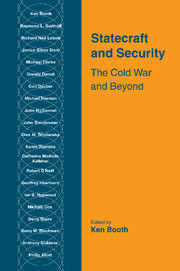Book contents
- Frontmatter
- Contents
- List of contributors
- Preface
- Introduction
- Part one Cold War: lessons and legacies
- Part two Post-Cold War: powers and policies
- Part three Beyond: resistances and reinventions
- 14 International peace and security in the twenty-first century
- 15 Affluence, poverty and the idea of a post-scarcity society
- 16 The future of the human past
- Conclusion: security within global transformation?
- Index
16 - The future of the human past
Published online by Cambridge University Press: 06 October 2009
- Frontmatter
- Contents
- List of contributors
- Preface
- Introduction
- Part one Cold War: lessons and legacies
- Part two Post-Cold War: powers and policies
- Part three Beyond: resistances and reinventions
- 14 International peace and security in the twenty-first century
- 15 Affluence, poverty and the idea of a post-scarcity society
- 16 The future of the human past
- Conclusion: security within global transformation?
- Index
Summary
There is no escape from yesterday because yesterday has deformed us.
Samuel Beckett, Proust (1931)Human nature. The human condition. Human history
These ideas are the self-forged chains which hold down the soaring human spirit. They exist nowhere but in the human mind, and yet they have made the human mind their prisoner. Humanity will begin to become all that it might be when it frees itself from deformed ideas of what it is.
We rationalise our unfreedom by metaphysicalising our situation. We are not merely what we are; we manifest human nature, our species-characteristics. We are not merely what we do; we live the human condition, our habitat. We are not merely what we could be; we are the residue of human history, our phylogeny.
We fight like caged animals, because to survive is to struggle. We are human predators and human prey, because the animal that hunts survives the jungle. We swarm like termites in social groups, because to survive is to co-operate. We lust like monkeys, because to survive is to multiply; reproduction is our evolutionary purpose and reward. Our nature contains such things. Our condition imposes such things. Our history proves such things. Who could deny a destiny that is written in nature? We will be what we have been is all we need to know.
In the human tragi-comedy of the state-system human nature and the human condition and human history are enacted on the grandest stage of all, the great theatre of the world.
- Type
- Chapter
- Information
- Statecraft and SecurityThe Cold War and Beyond, pp. 323 - 337Publisher: Cambridge University PressPrint publication year: 1998
- 3
- Cited by



